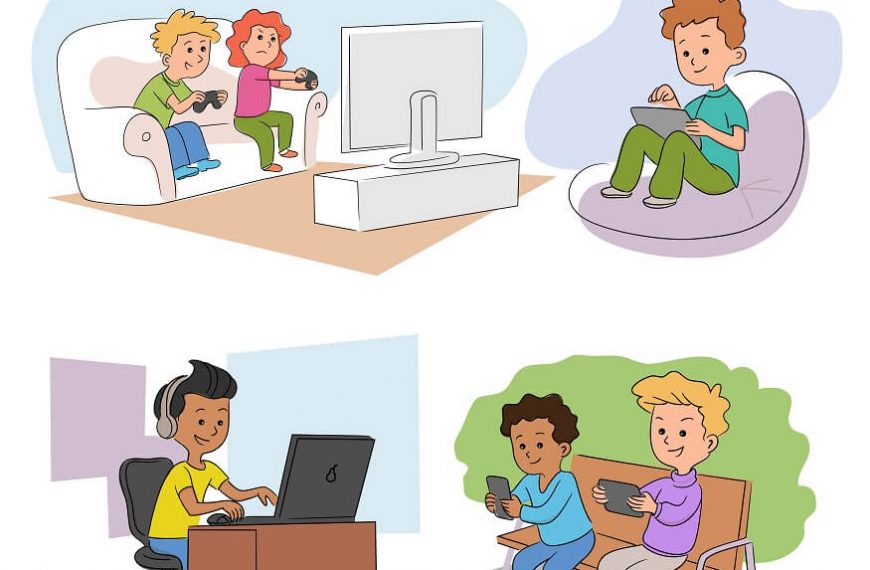Screen time for kids is one of the most debatable topics among parents. While we all understand that excessive screen time for kids can impact a child’s brain development, with the busy schedules and dependencies on technology, it is nearly impossible to restrict kids from having regular screen time. Most parents these days wonder how much screen time for kids is good enough and how to reduce the screen time for kids.
Parents and guardians always look for ways to enhance their child’s brain development. And with so much research suggesting the adverse effects of screen time for kids (including irritating behavior, mood swings, and brain development), many parents are finding ways to reduce screen time for kids. In the past few decades, massive technological advances have made accessing screens of all types easier and more affordable. As such, the time our children spend in front of screens has drastically increased.
From TVs and tablets to smartphones and video games, screens have become a significant part of our children’s lives. Raising a new set of worries and challenges for parents – how to reduce screen time for kids and give a safe, conflict-free space for their child’s brain development.
In this blog, we have shed some light on the effect of screen time on children’s behavior and development and how to reduce screen time for kids.
Excessive Screen Time is Harmful to Kids’ Health
Excessive screen time definitely has adverse effects on a child’s brain development. It can also enhance the risk of obesity because of reduced physical activity and interfere with crucial social interaction. As per the American Academy of Pediatrics (AAP), only limited amounts of entertainment media such as TV, videos, and computers should be used in children under two years old.
The AAP also recommends limiting screen time for kids to 1-2 hours daily (for children six and older). Excessive screen time leads to sleep disturbances due to blue light exposure, increased stress levels due to overstimulation, and even poor concentration due to dopamine addiction caused by social media usage. Screen time for kids can also be linked to depression and anxiety disorders (especially in teens) when constantly exposed to online bullying or cyber-aggression. Overall, parents and caregivers must be aware of the potential risks involved with excessive screen time for kids and take steps to protect their children from them.
When used responsibly, technology offers great potential to support kids in learning and exploring the world around them—but too much of it can be physically and mentally harmful.
Developmental Effects of Screen Time
A growing body of research reveals the potential developmental risks of prolonged screen exposure. High screen time can lead to various physical and mental health issues, including disrupted sleep patterns, poor posture, obesity, and decreased attention span.
In addition, excessive screen time has been found to erode children’s sense of empathy, inhibit their ability to understand nonverbal cues in social interactions and impair their self-regulation skills. These negative impacts are especially pronounced for young children exposed to screens before their brains fully develop.
The Role of Parenting in Limiting Screen Time for Kids
Monitoring your child’s screen time exposure is as important as the type of content they view. Parental involvement can mean the difference between the healthy use of screens and an unhealthy obsession.
- Establish Limitations
Parents should set boundaries on how much time their children can spend on screens. They may even consider having a “screen-free day” each week to encourage real-life interaction. This doesn’t mean confiscating all devices but instead setting a timer or ensuring the devices are used only in common areas at home.
- Monitor Content
Parents should also monitor what their children are watching on TV, playing on video game consoles, or viewing apps. Content ratings can be a valuable guide to understanding whether something is appropriate for your child’s age and maturity level.
- Encourage Interaction
Finally, parents should find other activities to engage their children’s imaginations and promote physical movements – such as board games or outdoor play. If a child has the energy to spare after school, try new activities such as cooking or painting together to reduce their desire for more screen time later in the day.
Ways to Manage Kids’ Screen Time
When managing screen time for kids, there are simple rules to ensure your children benefit from technology without having the potential harm associated with it.
- Setting Limits
The American Academy of Pediatrics recommends limiting media use to two hours per day for children over six. This applies to both entertainment and educational programming. Also, it is very crucial to be aware of the content your child is consuming, ensuring that it is age-appropriate and providing guidance when discussing any issues.
- Make Tech Time Active
Rather than simply allowing your child to passively watch TV or play video games, you should motivate them proactively about their screen time, like playing sports games or using interactive educational programs. This helps foster problem-solving skills, social development, and creativity.
- Modeling Good Habits
Leading by example is vital to encouraging good screen habits in young people and adults alike. Try limiting your own usage, being mindful of what types of content you consume, and interacting with technology alongside your children will help you resolve the problem- how to reduce screen time for kids.
Conclusion
It is essential for parents to be aware of the required screen time for kids and to set reasonable limits for age-appropriate activities. Ensuring kids get enough physical activity, sleep, and time outdoors is also important. This can help ensure that screen time for kids is not impacting their face-to-face social interactions, which are critical to children’s healthy development in many ways. Parents should consider using various tools to manage screen time for kids, such as parental controls, monitoring apps, and open dialog with their children about the importance of setting healthy online habits.
Eurokids preschool provides a safe and enriching environment for your child’s brain development. We ensure your kid is benefitted from the best education and development possible with our highly trained teachers and modern facilities. Our classrooms are designed not only for physical teaching but also for mental growth. Our comprehensive approach helps to foster healthy development while supporting good behavior formation – something we take seriously at Eurokids Preschool!
Contact us today to learn more about preschool admissions.
















